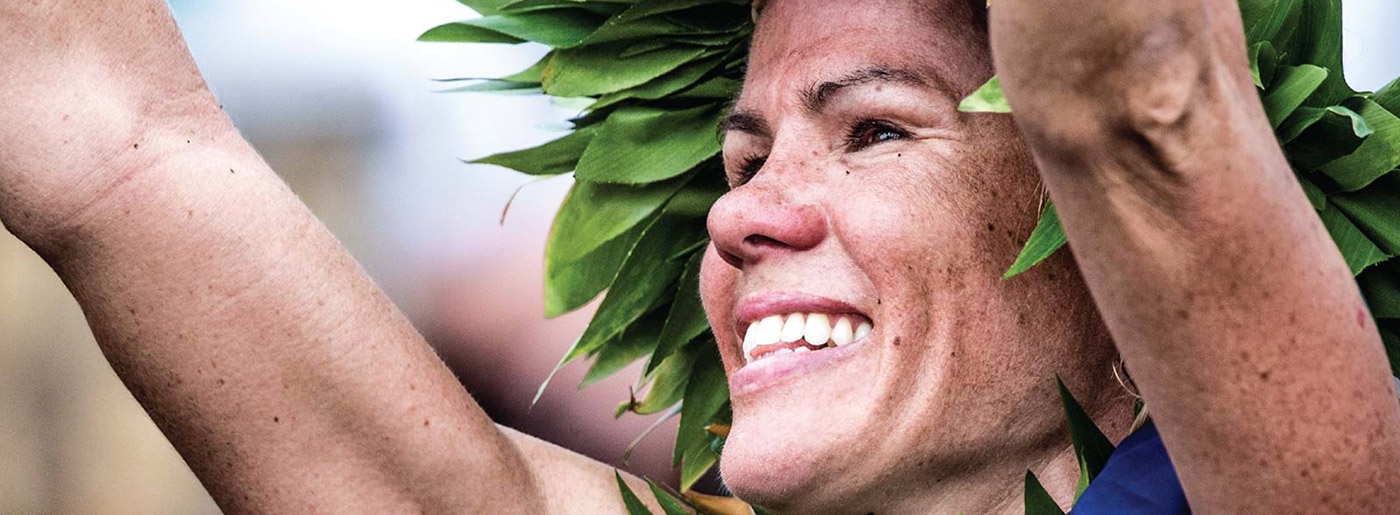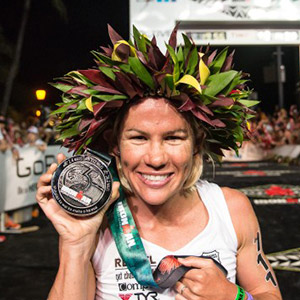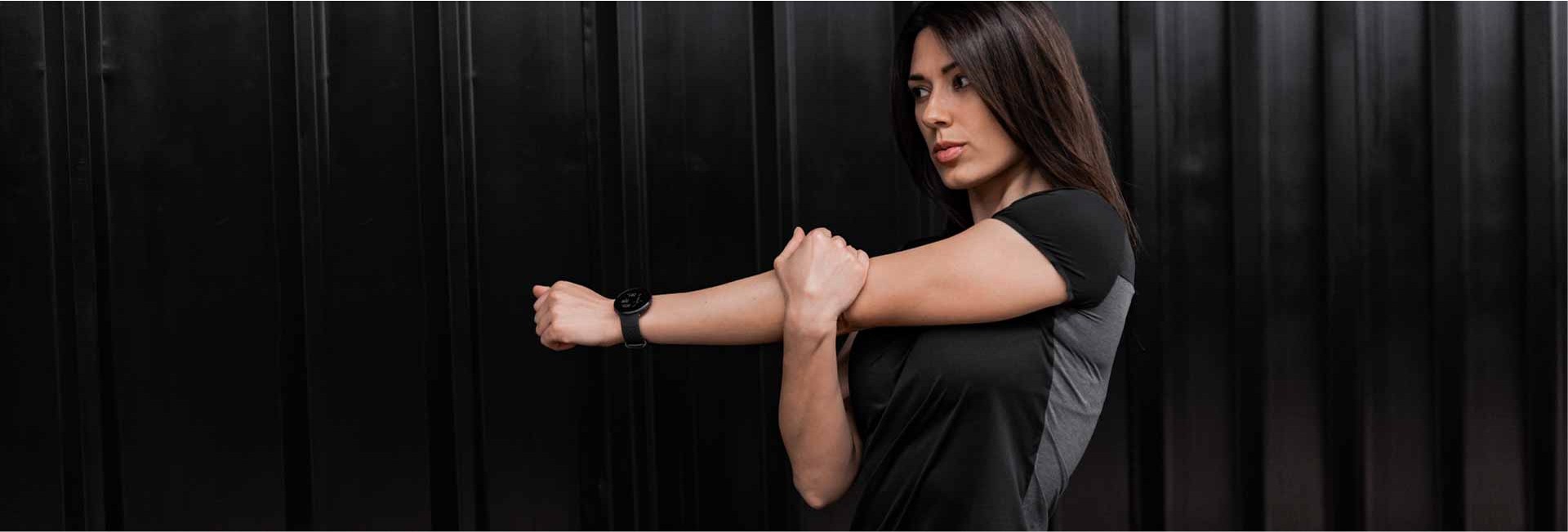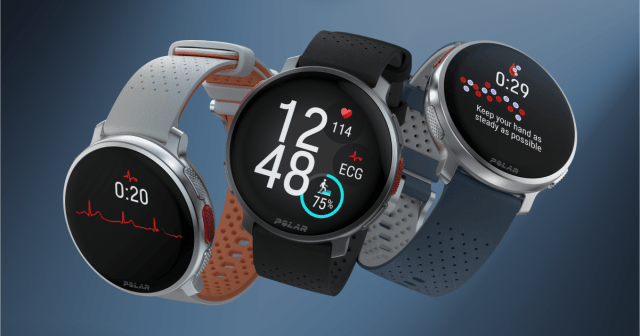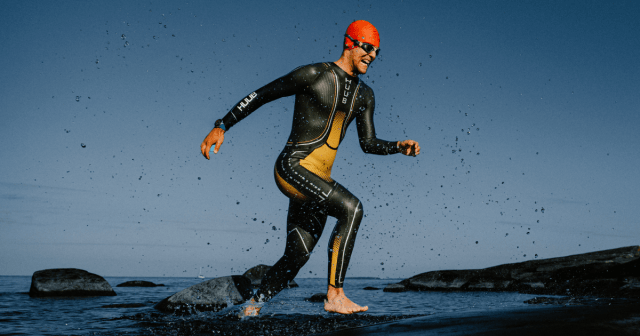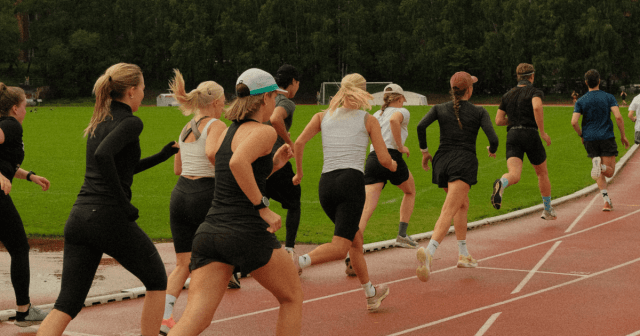We caught up with Polar athlete Mirinda Carfrae for this triathlon Q&A and talked about balancing motherhood and training, beginner-friendly performance tips, and how she ranks the three disciplines.
Even if you’ve only just dipped your toes into the triathlon scene, chances are you’ve heard of Mirinda “Rinny” Carfrae. Standing at a mere 161 cm, she’s a three-time IRONMAN World Champion with a dramatic flair out on the course.
Don’t let her small stature fool you – her come-from-behind victories and record-setting run splits have ravaged professional fields at triathlons across the globe, and both her competitive spirit and approachability have made her a favorite amongst fans and colleagues alike.
Our favorite piece of advice? You can’t race fast if you don’t train fast.
The triathlon Q&A questions below were submitted by our loyal Instagram community. Follow @polarglobal for product information, inspirational moments, and behind-the-scenes updates from athletes.
Photo credit: Talbot Cox
How did you end up choosing triathlon?
While I was playing basketball, I played forward, there were a number of athletes at the Institute of Sport in Australia that were doing triathlon. I was intrigued and urged to race based on my speed and running skill.
Was it your goal from the beginning to become a pro triathlete? If not, how and when did you decide to give it a shot?
I had some great success early on locally. I loved sport and this was a natural fit. I knew that the harder I worked the more I could advance. This I liked. Being short, I was overlooked in basketball even though I had this amazing work ethic. I liked being in control and initially dreamed of racing pro.
Polar: What was your breakout race(s) that helped you decide to turn pro? Year?
My breakout race that put me on this trajectory was Nice in 2005. It was a modified long course race and I won. It convinced me to stay focused on the longer races and really make some sacrifices to focus on the big IRONMAN 70.3 races. There are many that pushed to turn pro but this one convinced me of my new focus on long course and I have not looked back since.
Can you rank the three sports from your strongest to weakest?
In terms of triathlon, I think I rank them from the order with least favorite – swim, bike, and run. Swimming and biking are about the same. I enjoy training for both. I get a little more frustrated with swimming as it’s the one leg in the race that is hard to gauge where you are at until you finally get on the bike. I like the ability to know where I am. Both are getting stronger and both of these disciplines are high priority in the off-season.
What are your favorite types of training in each discipline – and what are the ones you dislike the most?
The training varies from long endurance training to fast cadence work in all three sports. I like long endurance training on bike and of course, cadence work while I run. Swimming is still a focus that is centered around very structured swim sessions. I do like open water swimming and get out as much as I can while at races.
How do you split your time between long endurance training or cadence work?
My secret weapon in IRONMAN racing is my cadence. I am training about 70 to 75 cadence. If I am out for a long shakeout run or my longest run leading into Kona, I will still do some efforts within the run to push cadence when tired so there is always cadence work. With the delivery of my daughter Izzy, I do quite a bit of running on the treadmill to maximize time and effort, and efficiency with balancing life in the new normal with a family.
IN WHICH heart rate zone do you spend most of your time when YOU’RE RUNNING? What sessions do you do to be at your fittest?
You can’t race fast if you don’t train fast. Training varies as does my ideal heart zone. I train at altitude, so I have some really steady training at base level that I’ll benefit from all year round. I do train at 80 to 90 percent top end for cadence work. I spend most of the time at 70 to 75 percent. On my hard sessions, I usually target 170.
To be honest I just started using HR while I was pregnant and now into post-Izzy training. I check my heart rate on key sessions and when I think I am tapping into a fatigue that needs to be addressed. I usually race with very little data. I do use the amazing ability of Polar to create interfaces I need for different settings, for training and racing and then speed and endurance work. Sometimes I just want to know what time of day it is and nothing else. I have the ability to get in my profile and adjust for what I want.
What are your training hours on a normal week?
During IRONMAN prep I am at 30 to 35 hours not including another 10 of actual recovery and body work.
How do you split your time up between disciplines? Do you do any cross training?
My cross-training is really done at the gym. Triathlon is all about cross-training and maximizing that balance. If I work hard in cycling for one week, that will always translate to my hard week of running and vice versa. I am really good about my offseason. I might dabble with some skiing or mountain biking. Right now it’s all about balance and the offseason is time for travel and family and just maintaining a fitness I know I can tap into.
What are the most important numbers and stats for you when training? What about during races?
Mile or kilometer times. This is something I know. I can reference data points but I still race knowing what I need to be at in terms of time. If someone gives me a split to the person in front I am pretty savvy with my calculations and confident in my ability, so it works well. I do love training in HR but when it comes to racing I don’t want any excuses!
How much sleep do you get? How do you boost recovery?
I get about seven hours and a late morning nap daily. I schedule naps. I started doing this once I began racing longer events. I eat well, I have all my nutrition dialed in, and enjoy my time in the Normatec boots with my chocolate milk. I also do regular bodywork to flush the muscles when in season – massages weekly with some of my gym work focused on stretching and balancing out muscle groups for preventative measures.
Has something in your training changed dramatically now when you are a mom? How are you able to balance the life of a pro athlete and being a mom?
I need more sleep. I also make everything count. Time with Izzy or time training is just that – making the most of every second. It’s really taught me to be organized and efficient. I do find that I am okay if an emergency comes up or I need to get Izzy sorted. She trumps all at the moment.
How have you and your husband [professional triathlete Tim O’Donnell] struck a balance around each other’s schedule and your daughter?
The nice thing for both Tim and I is that we have a live help for Izzy. We do sit regularly to review training as we have different coaches. At that time we mark off family time and, of course, balance out caregiving on the off hours, especially with work and or any appointments that come up. So far so good, but we are definitely new at this.
There are a lot of new moms in triathlon HITTING amazing results – does becoming a mom give you superpowers?
I find myself not sweating the small stuff. I feel stronger even though I might be more tired. It’s been a learning curve to make sure I am eating and resting enough for two. It’s not a perfect science but I’ve been learning quite a bit now that I am back racing. I need almost double nutrition to keep the feeding up while performing at the top again.
What advice do you have to people who aspire to start with triathlon?
Start where you are and have fun with it. The potential for improvement is huge but the work is hard and the reward high.
Any beginner-friendly performance tips?
Make it a lifestyle. Make it a healthy part of your life and enjoy it with friends and family. Get advice on setting yourself up with the right bike fit and the right equipment for you. The little things add up. Pay attention to the detail so you can have races and events that are about your experience out there and not the performance of your equipment failures!
You travel a lot between different continents for races and training. How do you fight jet lag?
I recover smart and try and get back on schedule in terms of sleep patterns. I also try not to fight it. If I am naturally up I try and use the time wisely. Staying hydrated is key. I love to travel so this is just a small downside!
Do you have a favorite race location? Course?
I loved the Island House race experience but the distances and time of year did not cater to my schedule. Thailand was amazing with their longer Olympic version. I still have my heart in Hawaii for Kona. I love that race and it’s the race that keeps me on my toes and excited all year. IRONMAN Cairns this past month was also a beautiful course.
Want some more inspiration? Follow Mirinda Carfrae on Instagram and watch the Tim & Rinny Show here.
If you liked this post, don’t forget to share so that others can find it, too.
Or give it a thumbs up!
I like this article
Please note that the information provided in the Polar Blog articles cannot replace individual advice from health professionals. Please consult your physician before starting a new fitness program.
